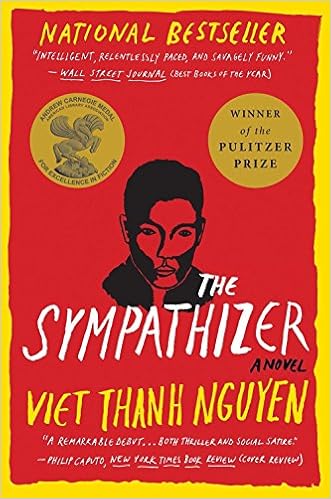
4 Stars
I am not a
reader of spy thrillers or war novels, but this book won the Pulitzer Prize for
Fiction and has appeared on the lists of several literary awards. What I enjoyed the most about the novel is
its social satire.
The
nameless protagonist-narrator is an Americanized Vietnamese with a divided
heart and mind. His narrative takes the
form of a confession written to a Commandant.
It begins in the final days of the Vietnam War when the Americans are
being evacuated from Saigon. The
narrator is an aide-de-camp to the chief of the South Vietnamese secret police,
but he is a Communist undercover agent whose handler is Man, a former classmate
who became a “blood brother”. He becomes
a refuge in Los Angeles but continues as a Viet Cong spy, keeping tabs on other
refugees who are making plans to return to Vietnam and mount a
counter-revolution.
In the
section detailing the narrator’s time in the U.S., social satire comes to the
fore. There are many comments on the
shallowness of American culture. For
example, “America’s most unique architectural contribution to the world [is] a
parking lot.” And “America, land of
supermarkets and superhighways, of supersonic jets and Superman, of supercarriers
and the Super Bowl! . . . Although every country thought itself superior in its
own way, was there ever a country that coined so many ‘super’ terms from the
federal bank of its narcissism . . . ”
The book is
also a satirical look at the promises of the American Dream. There is reference to the “Cyclopean eye of
the IRS” which means that taxation is “a basic tenet of the American
Dream. Not only must [a man] make a living,
he must also pay for it.” Refugees are
“hobbled by their structural function in the American Dream, which was to be so
unhappy as to make other Americans grateful for their happiness.” The refugees may want to assimilate but the
Americans are not easily accepting of them because “all yellow people are
guilty until proven innocent.” The
Vietnamese refugees remain a faceless, voiceless people.
The novel
provides a new perspective on the Vietnam War in contrast to the one provided
by Hollywood. The narrator serves as a
cultural advisor on a film about the war entitled The Hamlet. He wants to give
voice to the Vietnamese characters but “My task was to ensure that the people
scuttling in the background of the film would be real Vietnamese people saying
real Vietnamese things and dressed in real Vietnamese clothing, right before
they died.” It soon becomes obvious that
the author is criticizing the “egomaniacal imagination” of directors like Francis
Ford Coppola who would undoubtedly see a film like Apocalypse Now as “more important than the three or four or six
million dead who composed the real meaning of the war.”
Of course,
there is also a discussion of war and revolution. What is emphasized is the futility of the
Vietnam War for the Americans. And even
for the winners of the war, there is disillusion: “a revolution fought for independence and
freedom could make those things worth
less than nothing.”
This book
is not an easy read. The last section in
particular is difficult with its abundant brutality. The book, however, is a worthwhile read. The sympathizer is often more a spy on
Americans than on the South Vietnamese.
Though he is a Communist sympathizer, he shows that the South Vietnamese
are worthy of sympathy because they were largely abandoned and betrayed by the
Americans. The sympathizer summarizes
what was gained: “I said, Nothing,
nothing, nothing, a grinning simpleton huddled in the corner.”
No comments:
Post a Comment